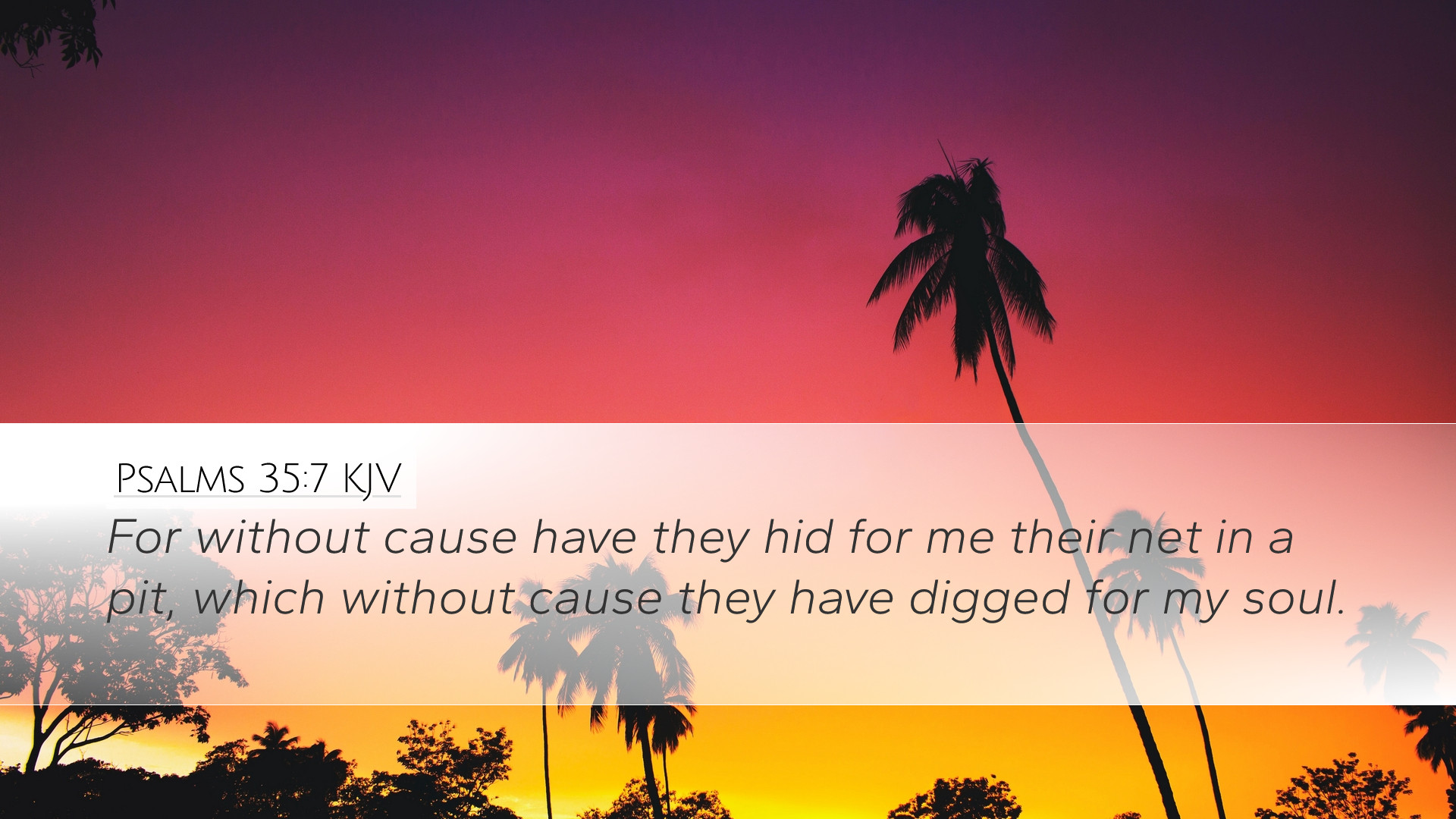Commentary on Psalm 35:7
Verse: "For without cause have they hid for me their net in a pit, which without cause they have digged for my soul." (Psalm 35:7)
Introduction
This poignant verse from Psalm 35 illuminates a powerful theme often found in the Psalms: the unjust persecution of the righteous. The psalmist, traditionally understood to be David, expresses his profound distress stemming from unfounded hostility and treachery. This commentary seeks to delve into its contextual meaning, linguistic nuances, and theological implications as understood from various public domain commentaries.
Contextual Background
Psalms, classified as a book of poetry and prayers, encompasses various literary styles, including laments, hymns, and royal psalms. Psalm 35 is a lament attributed to David during his adversities, particularly against foes who seek to harm him without reason. This psalm exemplifies the emotional depth of suffering and the quest for divine justice, providing insights into David’s relationship with God amidst turmoil.
Exegesis of Psalm 35:7
The verse in question portrays two main themes: the hidden snares laid for the psalmist and the injustice faced. Let's examine each aspect with insights from noted commentators.
The Hidden Net
Matthew Henry notes that the metaphor of a net implies a deliberate and deceitful act, highlighting the treachery of David’s enemies. David feels ensnared, indicating both physical and spiritual traps set for him. This reflects a deeper sense of betrayal, as his adversaries are covered by the guise of normalcy while harboring malign intentions.
Albert Barnes supports this interpretation by suggesting that the psalmist’s enemies are depicted as hunters who lay traps. Their actions are characterized by malice, as they act without any just cause, reinforcing the theme of undeserved calamity.
Adam Clarke elaborates that the 'net' symbolizes both physical threats and the metaphorical traps of slander and deception. Clarke emphasizes that these snares are not only designed to capture the psalmist but also to diminish his faith and integrity.
Injustice and Suffering
The repetition of 'without cause' underscores the intense feeling of injustice that pervades the verse. Matthew Henry identifies this repetition as a rhetorical device that emphasizes the speaker's innocence. It resonates with the universal cry of the oppressed, invoking God's justice.
Barnes contextualizes this suffering as emblematic of the broader human experience. He points out that many believers face wrongful accusations and unprovoked hostility, making this verse relatable to anyone who has suffered unjustly. This commonality serves to strengthen communal faith and reliance on divine protection.
Clarke reminds readers that this verse not only applies to David’s experience but metaphorically extends to Christ and ultimately to every Christian facing trials. Just as David felt hunted, Christians may also feel targeted in a world rife with sin and opposition.
Theological Implications
On a theological level, Psalm 35:7 invites deep reflection on God's justice and the reality of suffering. The phrase "hid for me their net" speaks to the sovereignty of God who sees all treachery and will ultimately bring about justice, reassuring believers of His presence amid trials.
Matthew Henry suggests that it is critical for the faithful to maintain their trust in God despite the apparent absence of just resolution in their circumstances. This faith is indicative of a deeper relationship with the divine, cultivated through prayer and trust in God's timing.
Albert Barnes notes that the psalmist's yearning for God's intervention represents a theocentric response to suffering. It encourages believers to seek God urgently, framing suffering as a catalyst for divine interaction and support.
Clarke posits that the psalm evokes a prophetic foreshadowing of Christ's unjust treatment, illustrating the universal nature of suffering and the hope for redemption and justice through faith. Each believer shares in this narrative of suffering and eventual vindication.
Practical Applications
This scripture encourages vital practical applications for contemporary readers, especially for pastors and theologians instructing their congregations and students:
- Facing Injustice: Encourage the faithful to remain steadfast in their beliefs and trust in God’s justice during times of personal and communal injustices.
- Prayer for Deliverance: Highlight the model of seeking God’s help through prayer, as demonstrated by David. Enable congregations to vocalize their struggles during prayer meetings.
- Empathy for the Suffering: Prompt communities to engage with individuals facing unfair treatment, fostering a supportive environment that is compassionate rather than judgmental.
- Hope in Divine Justice: Teach that while earthly justice may fail, ultimate justice belongs to God. Reinforce the message that He is aware of all injustices and will act according to His perfect will.
Conclusion
Psalm 35:7 serves as a resonant reminder of the perennial struggle against injustice and the assurance of divine oversight. Through the reflections of commentators like Henry, Barnes, and Clarke, this verse gains depth, inviting a profound understanding of human suffering, fidelity to God, and ultimate hope in his justice. As believers, the call remains to respond in faith and seek God's face amid adversity, trusting in His righteous judgment. This is a timeless appeal echoed throughout scripture—a call to resilience anchored in faith.


